If you hadn't heard via Twitter (and why would you?), I just returned from over two weeks of quality time in Japan. A lot of business and business planning, but also a whole lot of fun. The truly watershed event: this time, I had Steve along. Japan is a place that Steve and I have literally talked about since we were kids, and although I've since been to Japan many times (including a couple trips with my fiancee), Steve's once-monumental and well-beyond-ha-ha-doesn't-flying-suck fear of the aeroplanes kept him from joining me in the past. Now, it's as if his fear has been almost entirely, like, 35-Pass Secure Erased, totally Gutmann-style. Much like a 35-pass erase, it took him a whole lot of time and a whole lot of hard work to get rid of it — but on the plus side Steve's brain is now government compliant and be sold at a garage sale. What's that? I need to cancel my nationwide 35-Pass Erase Comedy Tour? Tough crowd.
Anyway, kudos to Steve. Great to have him there. (And also nice to have Dave and Mike join us later.)
So: Japan stories time!
Within minutes of riding on the first trains in Japan, I notice a significant change in advertising, from train to television. The trend? No more printed URL's. The replacement?
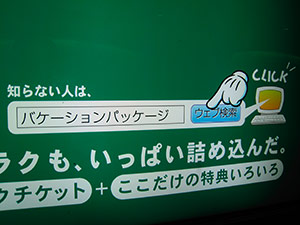
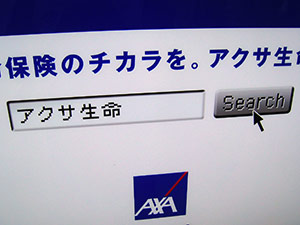
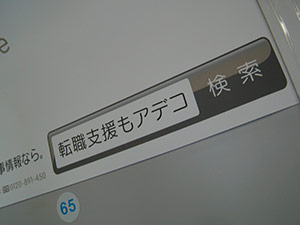
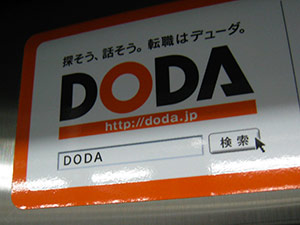
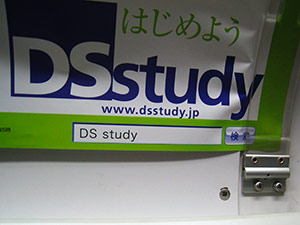
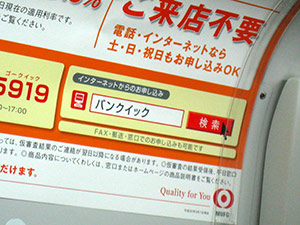
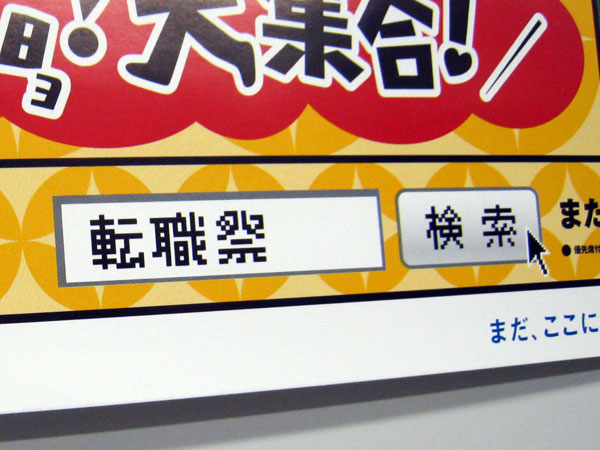
Search boxes!1 With recommended search terms!
It makes sense, right? All the good domain names are gone. Getting people to a specific page in a big site is difficult (who's going to write down anything after the first slash?). And, most tellingly, I see increasingly more users already inadvertently put complete domain names like "gmail" and "netflix" into the Search box of their browsers out of habit — and it doesn't even register that Google pops up and they have to click to get to their destination.
But, I ask you: could this be done in the USA? Wouldn't search spammers and/or "optimizers" ruin this within seconds? I did a few tests with major name brands and they're almost always the top hit on Google (surprisingly, even Panic). But if Nabisco ran a nationwide ad campaign for a hot new product and told users to Google for "Burlap Thins" to learn more, wouldn't someone sneaky get there before they do?
Despite my questions, this trend seems almost inevitable to me. In fact, I bet that some point in the future, Safari's title bar looks a little bit more like this:
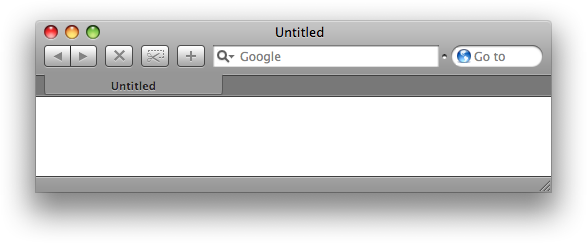
1. Like Pokemans, I really enjoyed "collecting" the varied search box design treatments: sometimes OS 9 style boxes, or glossy Vista style buttons, or a pointer, or the classic weird gloved hand, or a bitmap-y font, etc. This is but a small sample.


103 Comments:
One imagines such advertisements either
1) include virtually-guaranteed #1s, such as the company/brand/product name, which shouldn't ever slip from being a top result, and/or
2) are not meant as long-lasting ads. I.e. these are billboards and on buses, not business cards or magazines.
My wife confirms this. She stood directly behind someone and spelled out the URL only to watch the other person load up a search engine.
I think one of the biggest reasons for this is because URLs are in alphabet and Japanese just doesn't translate very well.
I did a quick test and as long as you use the japanese google page, they all show up as no 1. Mostly as Google sponsored links though. (web standards haven't really made it big in Japan yet)
Using search to promote your site is something that should be tried in the west too I think.
entering a URL in a cellphone is a pain, searching for a keyword is easier, so people are more used to do ing this than using URLs
I've given up with my non-geeky family and friends when I'm doing phone tech support and asking them to go to a website.
"Type domain.com into the address bar"
"OK which one do I click on"
"How do you mean? You should be seeing a green and blue page"
"No I've got a list on a white page"
"Did you type it into Google or the address bar"
"In the Google box"
"...OK...click on the second one in the list..."
Google is the internet, right?!
The irony is that even if you put a URL on an ad, I bet the majority of users will enter it in Google. At least you stand a better chance of having your site near the top of the results.
The other alternative to posting complicated Roman-letter URLs is to post Q-codes on advertisements. These 2D barcodes, which are everywhere encode web addresses and other information. You simply take a photo of the code with your cell phone, and the data is converted accordingly. A code posted on a bus stop might bring up a link to a mobile bus schedule, for example.
I did read the blog post too :) Interesting about the search box thing. Is there any advantage to the company to have kajillions of people searching for your company name? Maybe that will increase your pagerank?
And yes, it's Yahoo, not Google -- only gaijin and otaku use Google in Japan. Yahoo has it together here in search, and they own auctions, train schedule searches and many other popular verticals.
My guess is not that it has much to do with "all good domain names" being gone (especially if you go with unicode domains or romanization of japanese words, there are a surprising number of common words still available), but everything to do with URLs never having made all that much to the general public.
It's still easier here to tell people "look up this word in Yahoo" (better yet, show it with a little pictogram, as all ads seem to do nowadays), than telling them to "type http://www.blablabla"... Culture of the 'dubby dubby dubby dot' never made it to Japan.
It also reminds me that this very poorly thought-of marketing strategy gave me some great ideas for "SEO" cum extortion businesses (just on the right side of legal). Considering how internet-savvy most Japanese companies are, I reckon it wouldn't take all that much to google-steal (or yahoo-steal) their favourite word (be it a common noun or their own company name)... To be then resold at high price when they realize all those costly subway ads are worthless if they don't own the matching search keyword... :-D
Nefarious, I know... (who's in?)
And the thing about people using google to get to sites everytime they visit, that is very true too.
Some people just absolutely don't understand how it works.
It is like people calling Netscape Navigator the internet, or assuming Internet Explorer is the only way to get online.
With FF3 it's even better, because as you type in the address bar it searches the titles of previous pages as well.
The ideal situation is not having to visit a third party website at all but to have all information served in the same format (Google, RSS, whatever), or at worst be taken straight to the pages you're looking for - I hate trying to work out a new navigation just to find one thing!
To my mind, the more interesting question is "why haven't those same search spammers ruined it in Japan?" It's not like Japan has a different Internet, innocent of such lowlife.
This allows for bundling multiple resources under one tag or term, which sends the user exploring, rather than stuck with one document in a dead end.
Also, the japanese strategy builds on trust, the companies are confident to show up tops in search engines, and anything that ranks high in Google has to be good, right?
Safari is a bit annoying in that free text will just try to add .com to whatever you typed, which I don't think is nearly as useful.
Despite having tons of blogs, japan still has relatively less content on the web than the english speaking world (due mainly to the strength of the publishing industry who see the web as the great satan). Not a single japanese newspaper has a content-rich online version, for example. As this slowly changes, this practice may be forced to change too. But it will be around for a while at least.
Have you seen the averahe URL there? Usually at least two dots before you can hope to type .co.jp, and then subdirectories galore!
there are firefox extensions that fix simple url errors.
i am betting on a more flexible URL entry section that sends you to the most popular site based on what you typed - but not an actual search
My guess is that this has been going on for a while, it's not really a new trend but that as more new Internet users come online (huge portions of the population still do not access the Internet on the regular basis), dependence on search and the leading search providers will steadily increase over time.
URL's what?
Google "quick guide apostrophe" for more!
:)
Spotlight has changed the way I access apps. Command+space + part of the name + command+enter seems like a lot when I type it out, but somehow it is easy.
i'm sure it would work again on a distributed architecture
Someone would have to do a completely deliberate attack ad targeted at your search result to try and get people to change that behavior, and I wonder if it would be worth it. I mean, really... "Interested in the Honda Accord? Google for 'Toyota Camary.' Honda." Really? And trying to google bomb, or whatever, a phrase like "Toyota Camary" or "iPhone" or something would be a damn formidable task.
The only thing I could see truly fucking this in Japan would be a massive rise of Wikipedia popularity there. Generally, Wikipedia is the one thing that frequently subverts searches for something huge like "Cherry Coke." If Wikipedia didn't exist, an "I'm Feeling Lucky" search for "Cherry Coke" would take you to coca-cola.com, but since Wikipedia does, in fact, exist, you are instead taken to the "Coca-Cola Cherry" Wiki writeup.
the problem occurs when you do _not_ own that google'd phrase. in that case, you can do one of several things:
1) use a realnames-like service instead of google,
2) get yourself to the top of google's search results somehow, either by yourself or by paying someone,
3) buy adwords in case you don't show up first,
4) etc.
#1 is the renewed entrepreneur opp.
http://www.centernetworks.com/japan-ads-search-qr-codes
nr. 1 (バケーションパッケージ) means Holiday Package
nr. 2. axa - life insurance
the third one (転職支援もアデコ) means... "help with changing the job + adecco)
DODA is a brand i suspect
Hajime Jou (Let's start!) (not the serach team, the green line)
BANQUIC or Bank Ikku (Lets go to the bank) or something like this
the last one
celebration after u changed the job
nice seraches
Caution: the first link may not be work safe.
Rick Santorum was a US Senator who held very aggressive anti-gay positions and people fought back using Google.
There was also "Miserable Failure" as a search term that ended up leading to George Bush's bio page on the White House site.
Google bombing is old hat.
Scott Pilgrim, on finding out that the cute girl he saw at a party in Toronto works as a delivery courier for Amazon.ca: "Hey, Amazon.ca, that's the online bookstore or whatever, right? ... What's the website for that?"
But seriously: This is an example of Zooko's Triangle, which basically says "names cannot be global, securely unique, and memorable, all at the same time". URLs are global and unique, but not memorable, especially not in Japan; search terms are global and memorable, but not unique. Marc Stiegler, on that page, predicted this:
"A good example of a nickname management system is Google. Type in a name, and Google will return a list that includes all the entities Google knows, to which the name refers. Google makes a mapping between these nicknames and their keys (if we think of the url of a page as a trusted-path-style key, which will be discussed later). Often enough to be interesting, the first item in the list will be the one you wanted. But it fails often enough, and endless pages of other choices appear often enough, to never leave us in doubt that these identifiers are not unique mappings to single keys. As is already true in the current world, in a world filled with petname systems, a key goal of marketing would be to get your nickname listed at the top of the Google rankings for that nickname. "
I wrote more about the implications of this for identity, in my blog post FaceBook And Decentralized Identifiers".
No joke.
url: http://front.netmyne.com/info/whatIsNlia.jsp
I expect that because many URL's are longer or less obvious than the search term it may be that people are simply more comfortable using words that are familiar rather than a URL which can seem like a foreign language.
Then of course there's also the issue of typing confidence and, it might be wise to remember that not everyone out there is good with a keyboard.
Here's the link:
http://spinshell.tv/know/bark/nevan/urls-vs-search-in-japanese-train-ads
http://spinshell.tv/know/bark/nevan/urls-vs-search-in-japanese-train-ads
I also type in urls into the seach input field.
Wake up people, that was geek comedy gold!
Chris - AbundanceUnlimited.com
He was explaining me about the QR-codes. It look interesting.
I saw them in use on the italian snail-mail and on a website that printed QR-Codes on shirts to let other people add you as a friend on facebook... insane :-)
Anyway the (bad) habit of searching everything on google is widespread.
I often observed clients search THEIR OWN site on google to visit it...
Of course, this just raises the stakes higher for google-bombing and pagerank spammers.
The internet and the home computer are seeing a similar approach as of this time it seems. Location of files on the desktop, or URLs on the internet, are becoming less important than the metadata that describes them. Perhaps soon you will search more than you browse...
http://www.inquisitorx.com/safari/
I am in the same place and it is truly a pain in the a**.
Thanks. :)
You may note that the examples of what might get typed into a search engine would tend to be the "most general" elements: primarily TLD & SLD (e.g. "pontiac" [SLD]) -- in other words the domain is among the most heavily weighted strings to match for all "one-size fits-all" search engines [not just Google.COM]) -- this is nothing new!
This is why I often have referred to "one-size fits-all" search engines as the "white pages" of the internet -- it's usually a simple "name" lookup (if it were about "information", then the top result on a search for the term "amazon" would have to do with the Amazon river; but instead the top result is simply the domain name [amazon] -- and/but also note that many "one-size fits-all" search engines function as indexes to their respective TLD [e.g. whereas google.COM will tend to return amazon.COM, google.DE will tend to return amazon.DE]).
cheers
Masood Nasser
http://masoodnasser.blogspot.com
http://artinthemake.blogspot.com
The search thing is almost an SEO statement of prowess - ie "we own the words"!
Jana
wow nice article ,Excellent page...I appreciate this blog....
nice posting for this site.love to see this kind of site thank you for your comments .its really good comments ,its really good comments
thank you for your comments
Bathmate
Well that was a nice post
Job Sites
Post a Comment